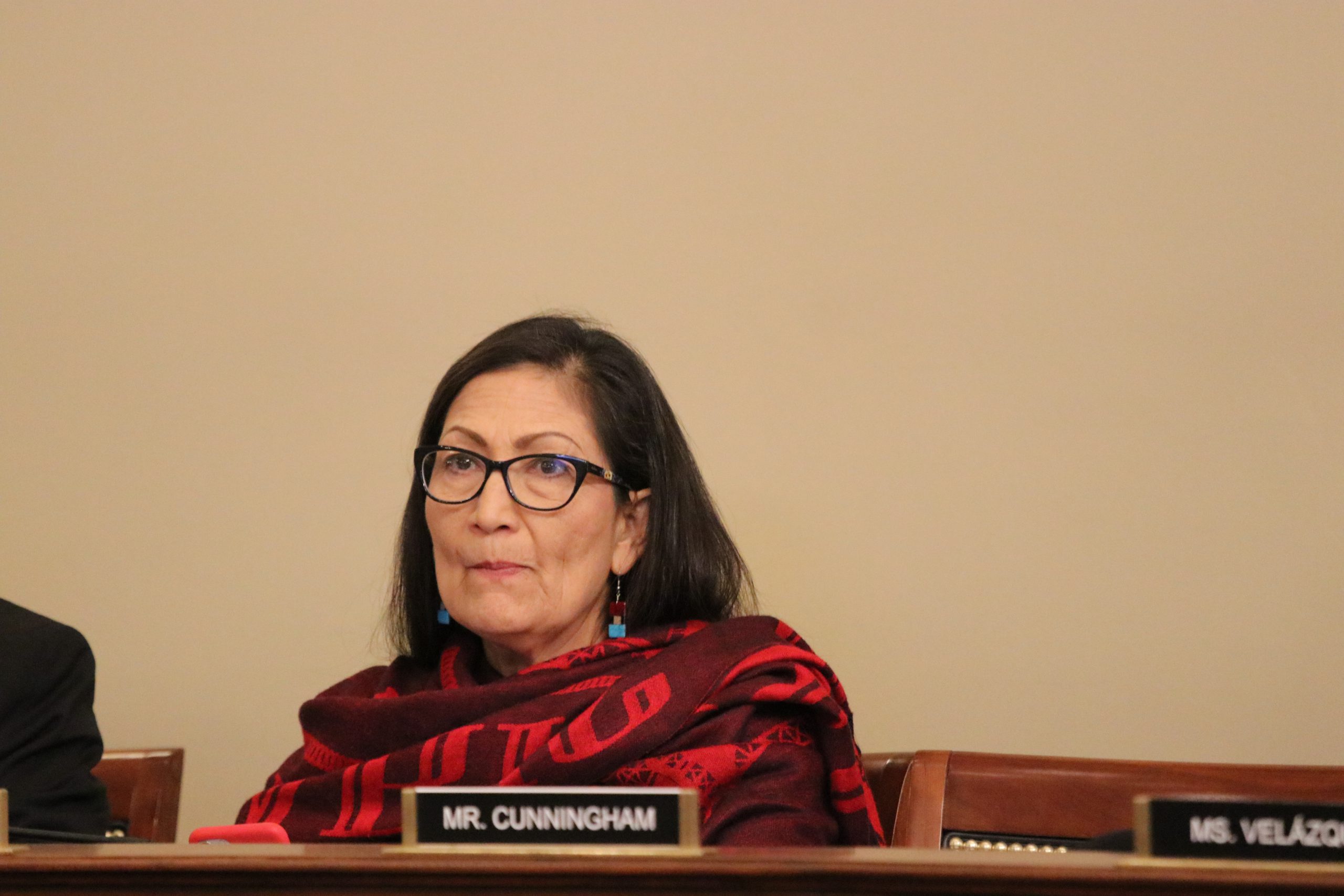
Rep. Deb Haaland (D-New Mexico) serves as vice chair of the House Committee on Natural Resources. Photo: House Committee on Natural Resources Democrats
March 24, 2020
Following Administration Briefing, Chair Grijalva and House Dems Call for Congressional Relief Bill to Address Desperate Health Needs in Indian Country
Washington, D.C. – Chair Raúl M. Grijalva (D-Ariz.), Vice Chair Deb Haaland (D-N.M.) and Rep. Ruben Gallego (D-Ariz.), chair of the Subcommittee for Indigenous Peoples of the United States – all of whom received a briefing from senior Indian Health Service (IHS) officials earlier today – jointly called on Senate negotiators and House leadership this afternoon to ensure the upcoming congressional coronavirus relief bill and any future relief measures adequately address the growing health needs across Indian Country. Tribes have faced unique funding delays in virus responses to date and are suffering from chronically underfunded health care services.
Grijalva sent a letter to IHS Principal Deputy Director Michael Weahkee on March 18 asking for more information on the agency’s health supplies and ability to meet the growing need for testing and treatment in Native American communities. Today’s briefing was a partial response to those questions, and the agencies said they would be following up with Grijalva and the other lawmakers to provide more complete responses in writing.
On the call, administration officials said the following steps will be taken in the coming days:
- The Centers for Disease Control and Prevention will post a funding opportunity announcement for the $40 million appropriated in the initial congressional response bill for Indian Country coronavirus response, which has beentrapped in bureaucratic limbo for several weeks now
- IHS will conclude tribal consultation “in the middle of this week” on how to distribute the $64 million appropriated directly to the agency in the Families First Coronavirus Response Act
- The Navajo Nation, which Weahkee said on the call now has 29 confirmed cases, will receive a second shipment of personal protective equipment from the Strategic National Stockpile by the end of today, following the first shipment delivered yesterday – both shipments include masks, gowns, gloves and other materials to protect medical personnel
- A multi-agency response effort, under the direction of the Federal Emergency Management Agency, will establish field hospitals and other medical facilities to administer care where it is needed, although it is unclear at this time where those sites will be located or what criteria agencies will use to decide where to focus their efforts.
“I’m encouraged to hear that the administration is now taking some of the necessary steps to support Indian Country, and the set of upcoming deadlines we heard about today will offer an important measurement of their progress,” Grijalva said today. “Congress needs to continue to give Indian Country the resources, funding and support necessary to protect human life and prevent the virus from spreading beyond our control, and the administration needs to distribute funds and support as quickly as possible to high-need areas. Native American communities have been neglected for decades, especially with health care and water infrastructure, and it will take an extraordinary effort just to reach the minimum standard we’ll need to meet in this crisis. Allowing COVID-19 to ravage tribes while the rest of the country starts the long recovery process is unacceptable, and Congress and the Trump administration both need to remember that as we craft a meaningful relief package.”
It was not clear from today’s call whether tribes will be able to waive Federal Emergency Management Agency disaster cost sharing. Several speakers on the call noted that tribal economies are suffering as casinos and other major revenue sources are shutting down due to the virus.
According to IHS officials, the agency itself does not have the medical personnel or infrastructure capacity to take advantage of new rounds of ventilators or other equipment. Instead, he said, Native patients who need intensive care facilities will be sent to nearby non-IHS health facilities to be treated as part of the general population. It was unclear from the call how tribal members will be handled when local hospitals become overcrowded, as many projections suggest will happen in the coming days.
Natural Resources Committee Democrats have set up an online resource center for impacted communities in the Committee’s jurisdiction at https://naturalresources.
“Every community in this country deserves access to the tools to fight coronavirus, but to date this administration has not been in good communication with Indian Country and hasn’t been sending the resources they need,” Haaland said. “Today’s call was a step in the right direction to ensure Native communities aren’t left behind as our country works to keep families safe and healthy. We’ll keep this administration’s feet to the fire and continue to ensure our legislative priorities are included in any relief package moving forward.”
“I am encouraged by IHS’s honest communication on this morning’s call,” Gallego said. “I urge them to continue to improve the process for meeting the urgent supply needs of Indian Country and to plan for the future as this pandemic worsens. Indian Health Service, Tribal, and urban Indian health facilities serve some of our most vulnerable populations but are among the most under-resourced in the country. That can have deadly results during a public health crisis like the one we are facing now. We must work together to save lives and keep Tribal communities safe and healthy.”
###
